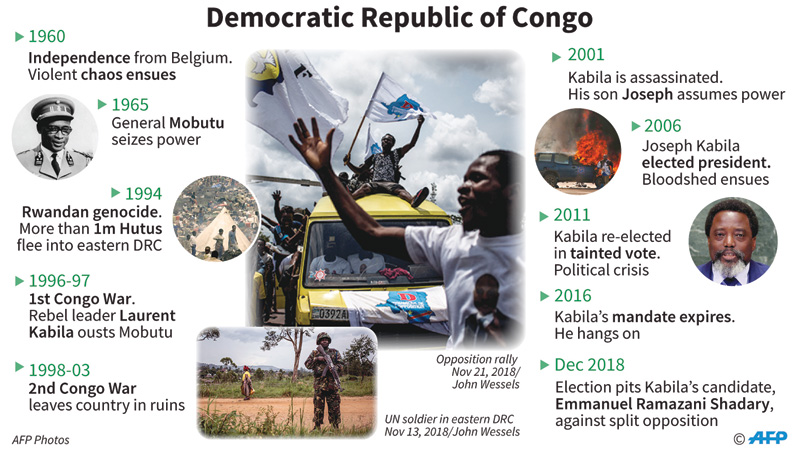

KINSHASA: Polling stations in Democratic Republic of Congo are ill-prepared for Sunday’s presidential vote, diplomats and an observer mission said, as polling released on Friday showed opposition candidate Martin Fayulu favoured to win.
Frustration has mounted across the country after repeated election delays and blunders as well as a decision this week to shelve voting in several opposition strongholds.
Protests flared for a second straight day in eastern cities in response to the decision to cancel voting in Beni and Butembo in the east and Yumbi in the west. Demonstrators see it as a manoeuvre by the government to suppress the vote, rather than a precaution due to an Ebola outbreak and militia violence.
In the eastern city of Goma, police fired tear gas during a standoff with protesters, while demonstrators in Butembo barricaded the streets and set fires at crossroads, according to local police.
Activist group Lucha said police had arrested 18 of its members during the protest in Butembo. The police confirmed arrests but did not say how many.
Last week the vote was pushed back to December 30 due to a lack of ballot papers in the capital. At the time, the national electoral commission (CENI) said preparations would be complete by the new date.
But two days ahead of the ballot, only about 60 per cent of election materials — including sheets to tabulate the vote — have been delivered to polling stations across the country, three foreign diplomats told Reuters on condition of anonymity.
Opposition leaders have accused authorities of trying to rig the vote in favour of outgoing President Joseph Kabila’s preferred candidate, Emmanuel Ramazani Shadary, using electronic voting machines. The government denies that.
“If the results sheets don’t arrive on time then it means that the vote results will be transferred via the voting machine, and that is going to enflame suspicions of fraud,” said one of these diplomats, who has been in recent contact with CENI officials.
CENI spokespeople could not be immediately reached for comment, but have said that the announced results will be based on hand counts of print-outs from the machines — as the opposition has demanded.
The election is meant to bring about the first democratic transition of power in the vast Central African country where regional wars around the turn of the century resulted in millions of deaths.
But a chaotic election day could spark fresh violence, as was the case after the 2006 and 2011 elections.
According to an internal UN document seen by Reuters, the CENI has increased the number of voters per polling station in the capital Kinshasa to 700 voters from the promised 600 by removing 1,094 polling stations.
As a result, the capital could face daunting 20-hour queues to vote, based on the average time it takes to use the voting machines, said Sylvain Lumu, of SYMOCEL, a domestic election observation mission. Polls are scheduled to remain open for 11 hours.
“All these measures aim to decrease Kinshasa’s voting power, since as you know Kinshasa is a city whose heart goes to the left,” he said, adding that 5,000 of his roughly 20,000 observers were still waiting for accreditation.
CENI has acknowledged that polling stations were reorganised, but said it was necessary after a warehouse fire two weeks ago burned 80 per cent of voting machines in Kinshasa.
Observers from the Catholic Church, African Union and Southern African Development will also be present for the vote, but the government has refused to accept election observers from the European Union and US-based Carter Centre, which said Kabila’s re-election in 2011 was marred by widespread fraud.
Public support for Kabila’s preferred successor, Shadary, has remained flat in recent weeks even as the popularity of opposition candidate Martin Fayulu soared.
The latest poll by a New York University-affiliated Congo Research Group showed Fayulu leapfrogging from third place in October to the top spot with 44 per cent support. He was ahead of the former frontrunner, opposition leader Felix Tshisekedi, on 23 per cent, and Shadary on 18 per cent. — Reuters
Oman Observer is now on the WhatsApp channel. Click here



